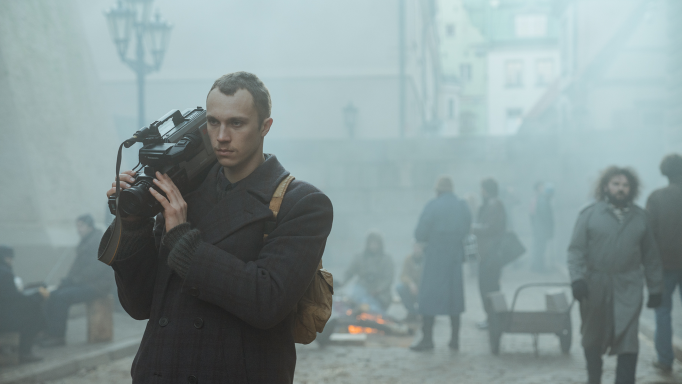Life under Soviet communism seems to be a popular subject at the moment (Servants). In another case in point, Viesturs Kairiss’s January takes us to Latvia on the brink of independence in 1991. Tanks regularly drive through the streets, parents prepare to protest against the Soviet Army for conscripting their children (and encourage their children to do the same), and the atmosphere is one of decay and violence.
Jazis (Karlis Arnolds Avots), a college student in Riga, tries to capture as much of what is happening around him with his camera, but seems uncertain as to what he can hope for. As his mother prepares to protest his conscription, she encourages him to pursue his passion for film, and he is genuinely unsure as to whether or not this is worth it. This is Latvia, after all, where he has to haggle in hidden little shops for access to video copies of Jim Jarmusch and Ingmar Bergman films, and where independence is a distant dream. What’s the point? Nevertheless, he enrolls in film school, where he meets fellow student Anna (Alise Danovska), someone equally passionate though perhaps more driven to make films, and they fall in love. Their aspirations are set against the increasingly real threat of aggression from Russia.
While this story may hit some familiar beats (artistic jealousy between lovers) and sometimes yields to a dreamy pacing that occasionally loses steam, it is nevertheless moving and suffused with vitality. Though it benefits from fine performances and strong imagery, its success is due largely to the specificity of time and place. Through director Viesturs Karliss’s portrait of a small country that has been at the mercy of Moscow for decades, Jazis’s hopes and fears have special resonance. One particularly excellent sequence comes as a bit of a surprise, when Jazis’s aunt dies and he spends a weekend in the country for her funeral, surrounded by mourners who still live a rural lifestyle with few resources. This sequence at first feels like a complete swerve from the narrative, yet gains poignance as it goes on. This life is not far away from the urban but decrepit environment of Riga, and we implicitly see Jazis observing his heritage and struggling to find his place in the world.
Another Latvian film, Blizzard of Souls (2019), also deals with the country’s struggle for independence, though set much earlier in the 20th century. It did so in overly Hollywoodized terms, yet it left this viewer curious to see more films about the country’s troubled history. January is one compelling answer.
In Floor van der Meulen’s Pink Moon, a different sort of drama is close at hand. Iris (Julia Akkermans), a single woman, and her brother, Ivan (Eelco Smits), a married man with children, are having dinner with their father, Jan (Johan Leysen), who is 74. He is retired, lives in a beautiful home, and appears to love his family very much. Nothing about the dinner in this brightly lit, modern kitchen, seems out of the ordinary. Then Jan announces that he intends to kill himself after his 75th birthday. His children do not initially believe him, and when they realize he’s serious, they turn angry. Ivan, though no less shaken, ends up going along with Jan’s plan and treating it like a serious conversation. Iris does not.
The film largely concerns Iris’s struggle to come to terms with her father’s decision as she spirals out of control and pulls herself back together. I’ll confess that I find set ups like this one gimmicky and manipulative, and I raised an eyebrow when I realized the sort of film I was watching. Nevertheless, though the plot does not stray too far from conventional expectations, by the end I was moved: the acting is beautiful, the characters are observed with specificity, and humor and pathos are kept in even balance throughout. Iris is allowed a spectrum of flattering and unflattering behavior, and her impulsivity, and the range of emotion her situation entails, is played forcefully by Akkermans. Though one might ultimately feel that the film is hampered by failing to subvert our expectations to a sufficient degree, its humor and emotional resonance make it satisfying.
January won the festival’s award for Best International Feature, while Pink Moon received the Special Jury Mention for Best New Narrative Director prize.








Leave A Comment